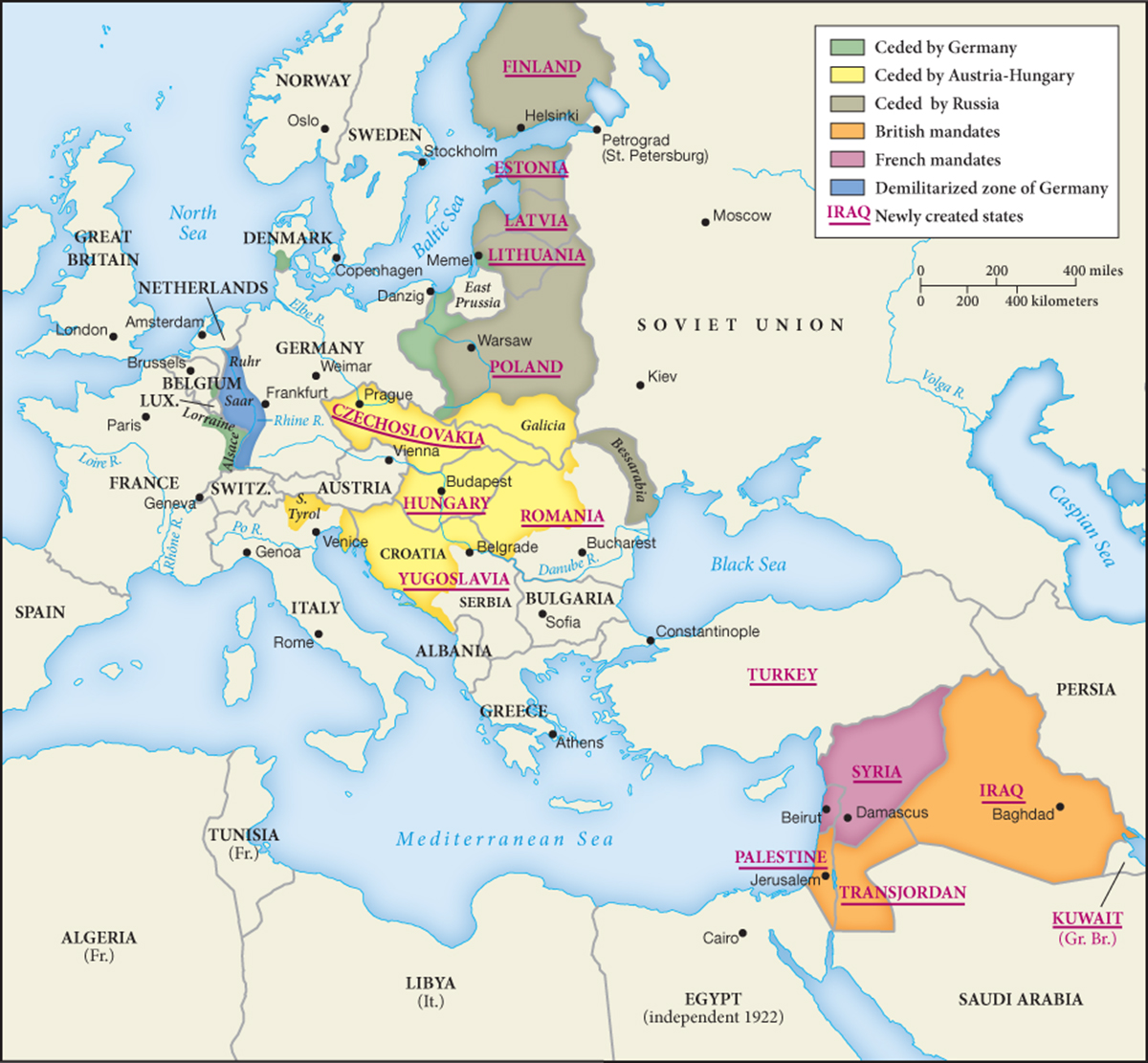Legacies of the Great War
The Great War shattered almost every expectation. Most Europeans believed in the late summer of 1914 that “the boys will be home by Christmas,” but instead the war ground relentlessly on for more than four years before ending in a German defeat in November 1918. At the beginning, most military experts expected a war of movement and attack, but armies on the western front soon became bogged down in a war of attrition; combatants engaging in trench warfare experienced enormous casualties while gaining or losing only a few yards of muddy, blood-
Change
In what ways did World War I mark new departures in the history of the twentieth century?
No less surprising were the longer-
The aftermath of war also brought substantial social and cultural changes to ordinary Europeans and Americans. Integrating millions of returning veterans into civilian life was no easy task, for they had experienced horrors almost beyond imagination. Governments sought to accommodate them, in Britain for example, with housing programs called “homes for heroes” emphasizing traditional family values. Women were urged to leave factory work and return to their homes, where they would not compete for “men’s jobs.” French authorities proclaimed Mother’s Day as a new holiday, designed to encourage childbearing and thus replace the millions lost in the war.
Nonetheless, the war had loosened the hold of tradition in various ways. Enormous casualties promoted social mobility, allowing the less exalted to move into positions previously dominated by the upper classes. As the war ended, suffrage movements revived and women received the right to vote in a number of countries—
The war also transformed international political life. From the collapse of the German, Russian, and Austro-

The Treaty of Versailles, which formally concluded the war in 1919, proved in retrospect to have established conditions that contributed to a second world war only twenty years later. In that treaty, Germany lost its colonial empire and 15 percent of its European territory, was required to pay heavy reparations to the winners, had its military forces severely restricted, and was required to accept sole responsibility for the outbreak of the war. All of this created immense resentment in Germany. One of the country’s many demobilized and disillusioned soldiers declared in 1922: “It cannot be that two million Germans should have fallen in vain…. No, we do not pardon, we demand—
The Great War generated profound changes in the world beyond Europe as well. During the conflict, Ottoman authorities, suspecting that some of their Armenian subjects were collaborating with the Russian enemy, massacred or deported an estimated 1 million Armenians. Although the term “genocide” had not yet been invented, some historians have applied it to those atrocities, arguing that they established a precedent on which the Nazis later built. The war also brought a final end to a declining Ottoman Empire, creating the modern map of the Middle East, with the new states of Turkey, Syria, Iraq, Transjordan, and Palestine. Thus Arabs emerged from Turkish rule, but many of them were governed for a time by the British or French, as “mandates” of the League of Nations (see Map 20.3). Conflicting British promises to both Arabs and Jews regarding Palestine set the stage for an enduring struggle over that ancient and holy land. Although Latin American countries remained bystanders in the war, many of them benefited from the growing demand for their primary products such as Chilean nitrates, used in explosives. But the sharp drop in nitrate exports after the war ended brought to Chile mass unemployment, urban riots, bloody strikes, and some appeal for the newly established Chilean Communist Party.
In the world of European colonies, the war echoed loudly. Millions of Asian and African men had watched Europeans butcher one another without mercy, had gained new military skills and political awareness, and returned home with less respect for their rulers and with expectations for better treatment as a reward for their service. To gain Indian support for the war, the British had publicly promised to put that colony on the road to self-
Finally, the First World War brought the United States to center stage as a global power. Its manpower had contributed much to the defeat of Germany, and its financial resources turned the United States from a debtor nation into Europe’s creditor. When the American president Woodrow Wilson arrived in Paris for the peace conference in 1919, he was greeted with an almost religious enthusiasm. His famous Fourteen Points seemed to herald a new kind of international life, one based on moral principles rather than secret deals and imperialist machinations. Particularly appealing to many was his idea for the League of Nations, a new international peacekeeping organization committed to the principle of “collective security” and intended to avoid any repetition of the horrors that had just ended. Wilson’s idealistic vision largely failed, however. Germany was treated more harshly than he had wished. And in his own country, the U.S. Senate refused to join the League, on which Wilson had pinned his hopes for a lasting peace. Its opponents feared that Americans would be forced to bow to “the will of other nations.” That refusal seriously weakened the League of Nations as a vehicle for a new international order.